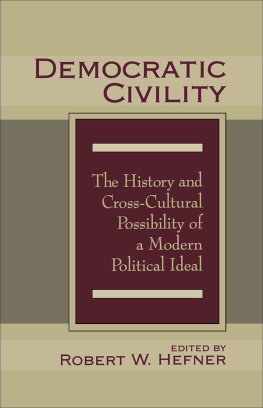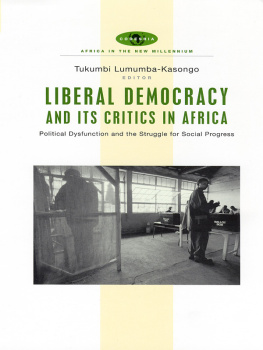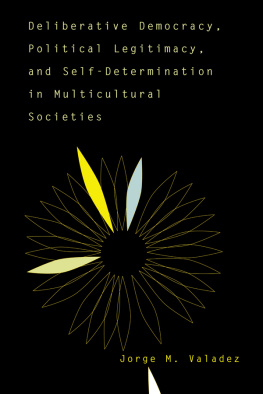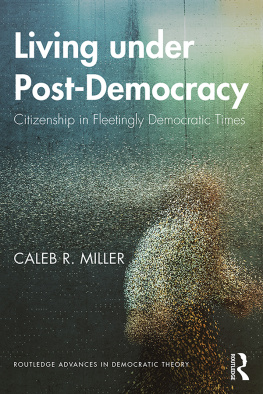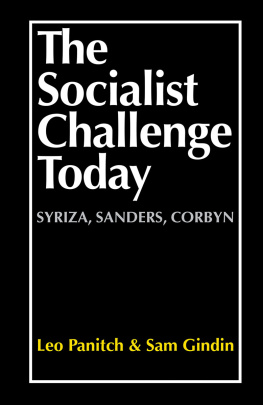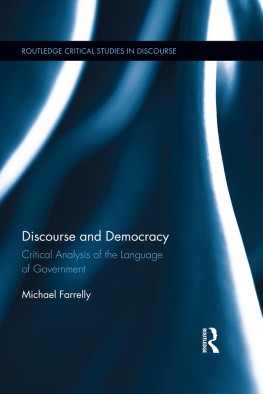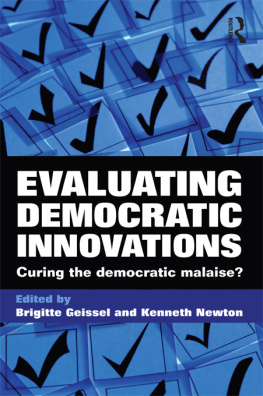First published 1998 by Transaction Publishers
Published 2017 by Routledge
2 Park Square, Milton Park, Abingdon, Oxon OX14 4RN
711 Third Avenue, New York, NY 10017
Routledge is an imprint of the Taylor and Francis Group, an informa business Copyright 1998 by Taylor & Francis.
All rights reserved. No part of this book may be reprinted or reproduced or utilised in any form or by any electronic, mechanical, or other means, now known or hereafter invented, including photocopying and recording, or in any information storage or retrieval system, without permission in writing from the publishers.
Notice:
Product or corporate names may be trademarks or registered trademarks, and are used only for identification and explanation without intent to infringe.
Library of Congress Catalog Number: 97-47003
Library of Congress Cataloging-in-Publication Data
Democratic civility : the history and cross-cultural possibility of a modern
political ideal / edited by Robert W. Hefner.
p. cm.
Includes bibliographical references and index.
ISBN 1-56000-364-2 (alk. paper)
1. Civil society. 2. Democracy. 3. Multiculturalism. 4. Pluralism
(Social sciences) I. Hefner, Robert W., 1952
JC336.D42 1998
321.8dc21
97-47003
CIP
ISBN 13: 978-1-56000-364-9 (hbk)
In the summer of 1993, the Institute for the Study of Economic Culture (ISEC) at Boston University inaugurated a four-year program on Civil Society and Civic Values. The program was intended to work in several educational fora, sponsoring research and conferences, running faculty seminars, and publishing books on the relationship between the economy, civil organizations, and democratic change. Though at the time there had already been a small flood of literature on civil society, the Institutes director (Peter L. Berger) and I hoped that ISECs history of research into modern markets, politics, and transcultural exchange might offer a useful vantage point on problems of democracy and civil society today.
This book is the fruit of one of the most interesting of those collaborative endeavors, a Working Group on Civil Society and Civic Culture that met over two weekends in the spring and fall of 1995. The original Working Group consisted of sixteen individuals from the United States and Europe. Funds to bring them together came from a grant by the Bradley Foundation to support ISECs Programs in Democracy and Civil Society. I wish to express my gratitude to the Foundation for their generous support. Four members of the Working Group, Peter L. Berger, Adam Seligman, John Hall, and myself, had earlier been involved in another ISEC project on civil society, a faculty summer seminar on democracy and civil society, held at ISEC during June-July of 1994. Our goal in that earlier seminar was to assess whether cross-cultural and multidisciplinary methods might better illuminate contemporary democracys challenges. To our delight, we found that this comparative effort did offer some novel insights.
Buoyed by our summer experience, we decided to extend this dialogue with the formation of the Working Group in 1995. We added to the initial core of four a larger group of scholars engaged in comparative research on problems of democracy and civil organization. Our goal in these two meetings was not to reach methodological or ideological consensus. Readers of the present volume will note more than a few differences of political commitment among contributors. The attempt to bring together scholars of different persuasions was necessary, I felt, because challenges to democracy in the post-Cold War era raise serious questions about the received nostrums of Left and Right. We are not living through an end to ideology; but we may be witness to a significant refiguration of the central ideological questions of our time. In such circumstances there may be wisdom in listening to viewpoints other than ones own, and recognizing that courage is not always found on just one side of a divide. In addition, of course, the central premise of democratic civility is that engagement across social barriers is a constructive feature of culture and politics, if managed with critical sensitivity. One only has to peruse the literature on democracy and society to realize that, though academic discourse pays homage to diversity, efforts toward its achievement in conferences and published work is regrettably rarerespecially, it seems, when it comes to matters of democratic theory!
For reasons of thematic coherence, the disciplinary scope of this volume came to include sociology, anthropology, and politics. This emphasis allowed us to create a volume that seeks to speak across all three fields; in so doing, it also attempts to redraw some of the conventional lines of debate. Sociologists and political scientists have made progress toward developing a framework within which to think about the political and ethical foundations of civil democracy. However, to assess the generalizability of this framework, we felt a need to draw on the resources of anthropologists and sociologists working at the margins of the Western world.
My hope is that readers of this volume will discover in these essays something of the excitement of our multidisciplinary exchange. They will also discover, however, something of its difficulty. After almost two years of interaction through meetings and correspondence among members of the Working Group, the gap between contributors interested in the Western genealogy of the idea of civil society and those attempting to decenter its insights across cultures remains a daunting one. This tension is one of the most vexing in contemporary political theory, and its resolution will require a deepening of the multi-disciplinary experiment attempted in this book.
I want to express my deep gratitude to Dr. Irving Louis Horowitz at Transaction Publishers, who ushered this volume through the review process with intelligence and consideration. I would like to think that this volume pays tribute to Dr. Horowitzs understanding of the seriousness of the challenge facing social and political theory today.
The Working Group and this volume would not have been possible without the tireless support and critical input of the ISEC Director, Peter L. Berger. Peters engaged interpretive sociology has been an inspiration to all of us in this project. I hope that in some small way this volume can repay our collective debt to him.
Robert Hefner
Boston University
1
On the History and Cross-Cultural Possibility of a Democratic Ideal
Robert W. Hefner
Few questions more clearly preoccupy our era than that of how to facilitate civil, free, and democratic interaction among the citizens of multicultural societies. In recent years, the importance of this challenge, the challenge of democratic civility, has become globally apparent. In the late 1980s and early 1990s, we were witness to a transformation of international politics more fundamental than any since the end of the Second World War. The collapse of European communism, the break-up of the Soviet Union, programs of economic restructuration, and efforts to advance human rights and the rule of law throughout the world-these and other developments seemed to mark a new era in global politics, characterized by widespread demands for civic rights and democratic participation.
These same events gave rise, however, to furious debates as to whether the culture and organization required to fulfill such aspirations were realizable across the diverse nations of the world. A few well-positioned Western analysts responded with an unhesitating affirmative to this question. In the immediate aftermath of the Cold War, in particular, one heard that we had transcended the central ideological struggles of this century, and arrived at the end point of mankinds ideological evolution and the universalization of Western liberal democracy as the final form of human government. This end of history was so decisive, it was asserted, that from this point on all serious political discussion would take place within the cultural horizons of liberal democracy.

